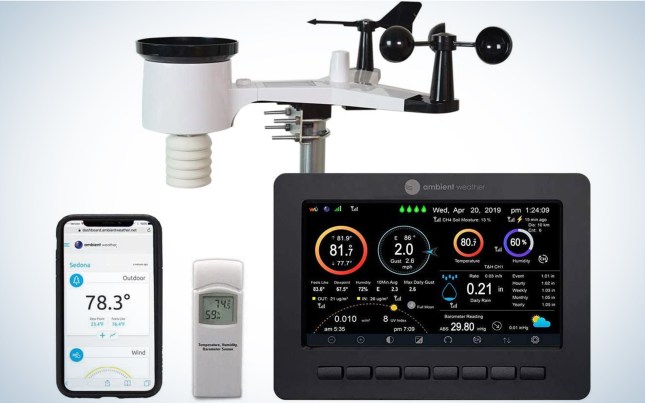Exploring the most recent Technological Developments in Weather Stations for 2024
Exploring the most recent Technological Developments in Weather Stations for 2024
Blog Article
Discovering the Various Kinds Of Professional Climate Stations for Accurate Information Collection
When it comes to choosing the appropriate weather station for data collection, the market uses a selection of options customized to various demands and settings. Allow's check out the nuances of these professional weather terminals to comprehend their special performances and determine the ideal fit for certain data collection requirements.
Digital Climate Terminals
In the realm of atmospheric instrumentation, electronic weather condition stations stand out as innovative tools for precise information collection and analysis. These innovative terminals are geared up with sensing units that catch a broad array of weather condition parameters such as temperature level, moisture, barometric pressure, wind rate, and direction. The information collected by digital climate stations is transmitted wirelessly to a main console or a computer for real-time surveillance and evaluation.
Among the vital benefits of electronic weather terminals is their capability to offer high-resolution data with precision and dependability. This level of precision is important for different applications, including farming, aviation, study, and emergency situation reaction. Digital weather condition terminals usually come with software that enables individuals to envision the information in various formats like graphs and charts, assisting in easier interpretation and decision-making.
Wireless Weather Condition Terminals
Structure on the capabilities of digital weather condition terminals, cordless weather stations use enhanced benefit and versatility in information transmission and surveillance. By making use of cordless technology, these weather terminals remove the need for cumbersome wired links, enabling very easy setup in various places. The wireless function enables real-time data surveillance from remote locations, supplying meteorologists and weather condition lovers with instant accessibility to critical information.
Wireless climate stations generally consist of sensing units that gather data on temperature level, moisture, barometric pressure, wind rate, and instructions. These sensors wirelessly send the information to a central console or receiver, where it is processed and presented for analysis. Some advanced cordless weather condition stations can also attach to the web, allowing individuals to access their weather data from another location by means of mobile phones or computers.

Prosumer Climate Stations
What identifies Prosumer Weather Stations from traditional consumer-grade weather condition terminals? Prosumer Weather condition Stations bridge the gap between professional-grade and consumer-grade devices, providing advanced attributes and higher accuracy than typical home weather stations. These terminals are developed for weather condition fanatics, amateur meteorologists, and small companies that need even more precise data than what consumer designs can give.
Prosumer Weather Stations commonly consist of a bigger variety of sensing units to gauge added meteorological specifications such as UV index, fallen leave moisture, and dirt dampness. They also tend to have a higher level of durability and reliability, making them appropriate for long-lasting exterior usage in different environmental conditions.
.jpg)

Industrial Weather Condition Stations
Industrial Climate Stations, likewise referred her comment is here to as meteorological surveillance systems, are specialized instruments made for accurate and durable weather condition data collection in commercial settings. These terminals are tailored to satisfy the one-of-a-kind demands of commercial operations where precise climate information is critical for security, performance, and decision-making processes.
Industrial climate stations are outfitted with advanced sensing units that can measure a large range of atmospheric visit their website specifications such as temperature level, moisture, wind speed and instructions, barometric pressure, and precipitation (Weather Stations). These terminals are frequently ruggedly developed to endure extreme environmental problems typically located in industrial settings
One secret function of commercial climate stations is their ability to supply real-time information monitoring and analysis. This enables commercial centers to prepare for weather-related threats, optimize operations based on weather condition conditions, and make sure the safety and security of personnel and equipment. Additionally, industrial weather condition stations can be integrated into existing industrial control systems for smooth information monitoring and automation.
Mobile Climate Terminals
Unlike fixed his comment is here commercial weather stations, portable weather condition terminals use versatility and wheelchair for on-the-go information collection in various environmental settings. These compact units are designed to be conveniently transferred to different locations, making them perfect for field research, emergency situation feedback situations, farming, building and construction websites, and outside events.
Portable weather terminals commonly consist of sensing units for determining parameters such as temperature, humidity, barometric pressure, wind speed, and wind instructions. Some progressed designs may also include added sensors for keeping an eye on rainfall, solar radiation, and UV levels. In spite of their little size, mobile weather condition stations are capable of providing exact and trustworthy data equivalent to that of larger, repaired stations.
One of the key benefits of mobile weather stations is their fast release and ease of configuration. On the whole, mobile weather stations are vital devices for professionals needing mobile, exact, and prompt weather information in varied setups.
Verdict
In verdict, specialist climate stations come in different types such as electronic, cordless, prosumer, commercial, and portable. By understanding the differences in between these kinds of weather condition stations, individuals can make informed choices to guarantee they get the most accurate and reputable weather data for their purposes.
)))))
Structure on the abilities of digital weather stations, cordless climate terminals provide enhanced convenience and flexibility in data transmission and monitoring. Some advanced cordless climate terminals can also attach to the web, allowing customers to access their weather condition data remotely via smart devices or computers.
Prosumer Weather Stations bridge the void between professional-grade and consumer-grade equipment, supplying more advanced attributes and higher accuracy than normal home weather terminals. Weather Stations. In general, portable weather condition stations are invaluable tools for specialists needing mobile, precise, and prompt weather details in diverse setups
By recognizing the differences in between these kinds of weather stations, individuals can make educated choices to guarantee they get the most reputable and specific weather data for their functions.
Report this page